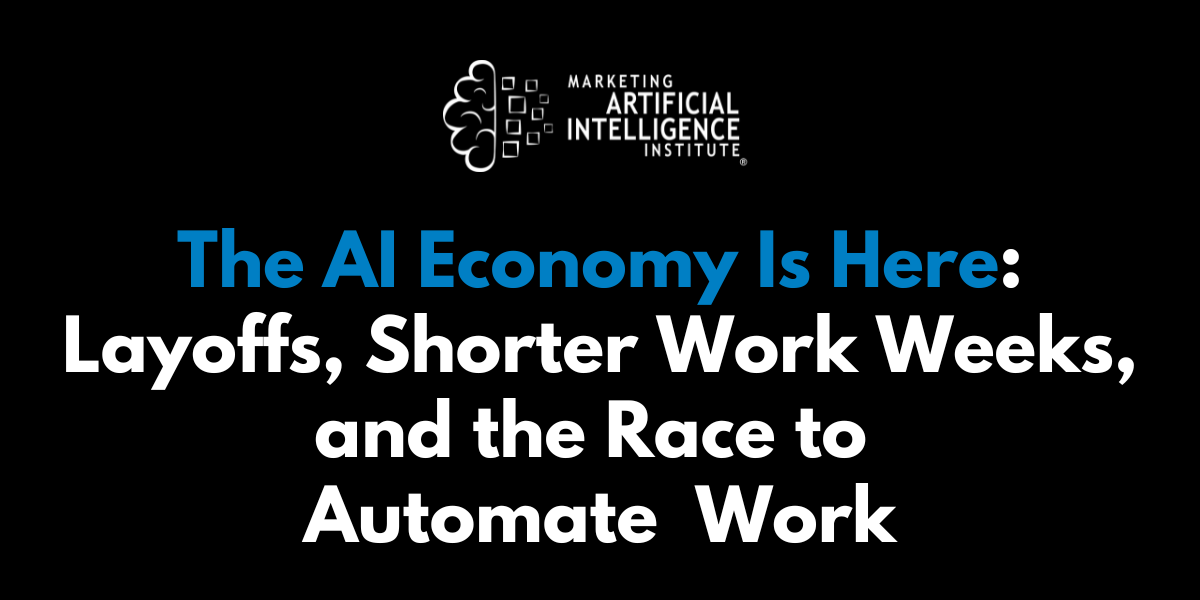In the span of just one week, the global economy sent a flurry of signals that AI’s impact is no longer theoretical.
The Federal Reserve cut interest rates, citing economic uncertainty. Fiverr laid off 30% of its staff to become an “AI-first company.” The CEO of Zoom predicted a three-day workweek is on the horizon. And a wave of new research papers from labs like Google DeepMind and Anthropic painted a clear picture of a future where autonomous AI agents drive massive economic value.
It leads us to believe these are interconnected signs that the AI economy is starting to reveal itself in corporate restructurings, central bank policies, and massive new investments.
To understand what these signals mean and how they connect, I turned to SmarterX and Marketing AI Institute founder and CEO Paul Roetzer on Episode 168 of The Artificial Intelligence Show.
The takeaway? We’re starting to see a new economic reality taking shape faster than most are prepared for.
The New Corporate Playbook: “AI-First” Means Fewer People
The clearest signal came from the online marketplace Fiverr, which announced it was laying off 30% of its workforce to transform into an “AI-first company.” The goal, according to its CEO:
"We are launching a transformation for Fiverr, to turn Fiverr into an AI-first company that's leaner, faster, with a modern AI-focused tech infrastructure, a smaller team, each with substantially greater productivity, and far fewer management layers.”
This move crystallizes what Roetzer has predicted: that plenty of companies will go the route of using AI to eliminate jobs in pursuit of productivity.
“They didn't deny this at all,” he says. “‘AI-first’ in their world means fewer people and prioritizing tech over people, which is what I’ve always said. This is exactly what’s going to happen.”
At the same time, Zoom’s CEO predicted AI will soon make a five-day workweek unnecessary, paving the way for a three-day schedule. While this sounds like a win for work-life balance, it’s two sides of the same coin: AI’s productivity gains will enable some to work less, while making other roles redundant entirely.
How AI Is Learning to Do Your Job
While headlines focus on layoffs, the real story is happening behind the scenes, where AI labs are spending billions to teach models how to perform complex white-collar jobs. A recent report from The Information revealed that labs like Anthropic and OpenAI are creating “reinforcement learning environments” or “gyms”—essentially fake versions of enterprise apps like Salesforce, Zendesk, and Microsoft Excel—to train AI agents.
Anthropic is reportedly planning to spend $1 billion on these initiatives over the next year, while OpenAI’s data-related costs could hit $8 billion by 2030. Part of that cost involves hiring human experts like doctors, lawyers, consultants, and software engineers to show the models how to perform specialized tasks within these simulated apps.
“People who don't think that these labs and these VC-funded startups want to replace humans, you are completely missing what's happening,” says Roetzer. “They absolutely intend for them to do that.”
This has given rise to a booming new industry of AI training. The CEO of Mercor, a firm that provides human experts to AI labs, says the company has scaled its revenue run rate from $1 million to $500 million in just 17 months. He declared in another post that: “The Economy will become an RL Environment Machine.”
The View from the Labs: A Future of Autonomous Agents
The vision driving these massive investments became clearer with a new paper from Google DeepMind titled “Virtual Agent Economies.” It starts with a bold prediction:
“Current technological trajectories could potentially lead to a global economy in which autonomous AI agents interact with one another to generate economic value independently of human labor.”
The paper envisions a future where agent-to-agent interactions become the norm, handling everything from commerce to research without direct human oversight.
“It’s no longer a human sending an agent to do something,” says Roetzer. “It’s a human telling an agent ‘Here’s what I want to achieve, here’s what I want the outcome to be, here’s what I want to purchase.’ And then the agent goes and does something. It starts interacting with other agents and humans get extracted from the loop except the very beginning and very end.”
This vision is backed by staggering forecasts. An Epoch AI report, commissioned by Google DeepMind, predicts that training frontier AI models will require investments of hundreds of billions of dollars by 2030, but could in turn generate trillions of dollars in new GDP. Meanwhile, Anthropic’s latest Economic Index report noted a sharp increase in “directive automation,” where users delegate complete tasks to AI, jumping from 27% to 39% of conversations in just nine months.
What This All Means For You
The convergence of these trends—corporate restructuring, massive R&D in automation, and new agent-driven economic theories—points to a disruptive future. And while 40 leading economists have signed a letter urging the US Department of Labor to track AI’s impact on jobs, Roetzer is skeptical that institutions will move fast enough.
“Good luck,” he says. “The US government is not going to tell you if they’re seeing trendline data that says AI is going to take jobs.”
But the disruption also creates an enormous opening for proactive professionals and businesses. The diffusion of AI across the corporate world will still take years, creating a runway for those who develop AI literacy now.
“I just see a very extended runway for people who are highly competent with AI tools and have domain expertise,” says Roetzer. “You have a wonderful runway ahead of you to be more valuable in your company.”
The key is to connect the dots, take AI’s impact on the economy seriously, and start adapting.
Mike Kaput
Mike Kaput is the Chief Content Officer at SmarterX and a leading voice on the application of AI in business. He is the co-author of Marketing Artificial Intelligence and co-host of The Artificial Intelligence Show podcast.


